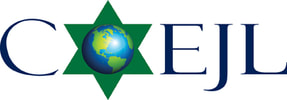Sustainability and Pollution.
When something breaks, a question may arise: repair it, or get rid of it and buy a new one?
The decision whether to reuse or discard an object in part emerges from how a person relates to material possessions: as essential or expendable, indispensable or disposable. Age-old Jewish teachings reveal a Jewish vision for 'holy use' of the material world and relate deeply to today’s need for sustainable resource use.
Jewish sources abound with examples of reusing ritual objects. The Talmud Sages Rav Ami and Rav Asi stated concerning the reuse of ritual bread, “Since one mitzvah (commandment) was done with it, we should use it for another mitzvah”(Babylonian Talmud, Tractate Berachot 39b). The principle manifests in a number of other Jewish practices, including the custom to use the myrtle from the lulav bundle (four species) of Sukkot as the pleasing fragrance for Havdala.
The truly righteous recognize the value of their G-d-given possessions, and are very careful with them, no matter how small or seemingly insignificant they are. Reuse is their message.
This perspective is foreign to our current “disposable” lifestyle, which has tangible, environmental consequences. For example, the United States’ National Academy of Sciences estimated that each year, humans put 6.4 million tons of marine litter into the oceans. This debris entangles sea life, and harms marine animals such as sea turtles, seabirds, and marine mammals who come to eat the debris. Marine debris can harm important marine habitats like coral reefs, which serve as the basis of marine ecosystems.
How could it be that we generate so much waste? It brings us back to the small choices—one plastic bag at the checkout stand, or one item you could have fixed instead of replaced—multiplied by decades of such consumption patterns and now billions of people. Things add up. While recycling is often synonymous with 'green,' acts with far greater environmental impact include reducing what one uses in the first place, and reusing what one does use. Hence the phrase, “Reduce, reuse, recycle.”
The affluence and abundance of Western society today presents both an environmental and a religious challenge—to avoid needless waste and use the resources of the physical world in a holy way. If we live up to the task, we can discover both physical and spiritual rewards through our “holy use” of the material world.
Rabbi Yonatan Neril
The decision whether to reuse or discard an object in part emerges from how a person relates to material possessions: as essential or expendable, indispensable or disposable. Age-old Jewish teachings reveal a Jewish vision for 'holy use' of the material world and relate deeply to today’s need for sustainable resource use.
Jewish sources abound with examples of reusing ritual objects. The Talmud Sages Rav Ami and Rav Asi stated concerning the reuse of ritual bread, “Since one mitzvah (commandment) was done with it, we should use it for another mitzvah”(Babylonian Talmud, Tractate Berachot 39b). The principle manifests in a number of other Jewish practices, including the custom to use the myrtle from the lulav bundle (four species) of Sukkot as the pleasing fragrance for Havdala.
The truly righteous recognize the value of their G-d-given possessions, and are very careful with them, no matter how small or seemingly insignificant they are. Reuse is their message.
This perspective is foreign to our current “disposable” lifestyle, which has tangible, environmental consequences. For example, the United States’ National Academy of Sciences estimated that each year, humans put 6.4 million tons of marine litter into the oceans. This debris entangles sea life, and harms marine animals such as sea turtles, seabirds, and marine mammals who come to eat the debris. Marine debris can harm important marine habitats like coral reefs, which serve as the basis of marine ecosystems.
How could it be that we generate so much waste? It brings us back to the small choices—one plastic bag at the checkout stand, or one item you could have fixed instead of replaced—multiplied by decades of such consumption patterns and now billions of people. Things add up. While recycling is often synonymous with 'green,' acts with far greater environmental impact include reducing what one uses in the first place, and reusing what one does use. Hence the phrase, “Reduce, reuse, recycle.”
The affluence and abundance of Western society today presents both an environmental and a religious challenge—to avoid needless waste and use the resources of the physical world in a holy way. If we live up to the task, we can discover both physical and spiritual rewards through our “holy use” of the material world.
Rabbi Yonatan Neril
